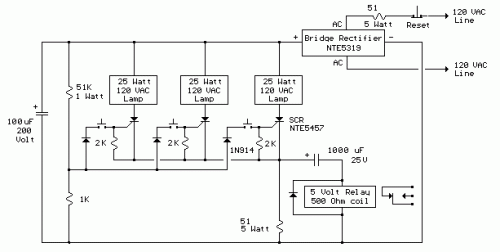FREE
circuits!
How to build Game Show Indicator Lights (Who's First)
August 8, 2010 - category: Fun and gamesDescription
The circuit below turns on a light corresponding to the first of several buttons pressed in a "Who's First" game. Three stages are shown but the circuit can be extended to include any number of buttons and lamps.
Three SCRs (silicon controlled rectifiers) are connected with a common cathode resistor (50 ohm) so that when any SCR conducts, the voltage on the cathodes will rise about 7 volts above the voltage at the junction of the 51K and 1K ohm resistors and prevent triggering of a second SCR. When all lamps are off, and a button is pressed, the corresponding SCR is triggered due to the voltage at the divider junction being higher than the cathode. Once triggered, the SCR will remain conducting until current is interrupted by the reset switch. Or, you can just turn the power off and back on.
A 50 ohm, 5 watt resistor was selected to produce a 10 volt drop at 200 mA when a single 25 watt lamp comes on. Higher wattage lamps would require a lower value resistor, and visa versa. For example to use 60 watt lamps and maintain the 10 volt drop, the peak current would be 60/160 = 375 mA and the resistance would be E/I = 10/.375 or about 27 ohms at 3.75 watts. The SCRs are "Sensitive Gate' types which trigger on about 200 uA and the gate current is around 1.5 mA when the first button is pressed. The 1N914 diodes in series with the buttons gates are used to prevent a reverse voltage on the gate when a button is pressed after an SCR is conducting. The two 51 ohm resistors will be fairly large in physical size (compared to a 1/4 watt size) and should be rated for 5 watts of power or more. Use caution and do not touch any components while the circuit is connected to the AC line.
Adding a Buzzer:
The relay shown in parallel with the 50 ohm cathode resistor can be used to momentarily power a buzzer with an external circuit through the contacts. The 1000 uF capacitor causes the relay to energize for about one second, longer times can be obtained with a larger capacitor.
Parts List:
Quantity - Description
- 1 - 4 Amp/400 Volt Bridge Rectifier
- 3 - Silicon Controlled Rectifier (SCR)
- 3 - 120 VAC/ 25 Watt incandescent lamp
- 1 - 50-100 microfarad/ 200 volt capacitor
- 1 - 1000 microfarad / 35 volt capacitor
- 1 - 50 ohm resistor/ 5 or 10 Watt
- 3 - Push Button Switch (normally open)
- 1 - Push Button Switch (normally closed)
- 3 - 2K resistor, 1/4 watt
- 4 - 1N914 Diode
- 1 - 51K resistor, 1 watt
- 1 - 2 Amp Fuse
- 1 Relay (SPDT) 9 Volt DC, 500 ohm coil
Circuit diagram
circuit from http://www.bowdenshobbycircuits.info/page7.htm#game1.gif


 This category
This category